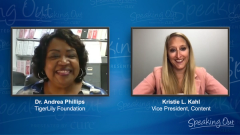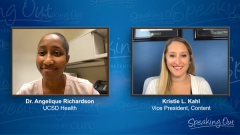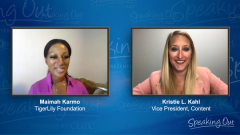
Joining a Breast Cancer Clinical Trial
On behalf of TigerLilly Foundation, CURE spoke with Dr. Andrea Phillips about clinical trials in breast cancer.
Kristie L. Kahl: Why is it important for patients to consider joining a clinical trial?
Dr. Andrea Phillips: I'm happy to answer this question because I think it's very important for people that understand the way that medications are made and the way that treatment plans are made for different diseases. And in this case, particularly cancer, it starts off with the scientists in the lab, but the way that it ends up being applicable to humans is that the method that was tried in the lab has to be tried on people. It's not baseless, it's always gone through rigorous trials in test tubes and animals before it's tried in humans. And it's tried in a few humans and then more. And if we don't get people to volunteer, to try those treatment plans or medications, we never know what works well, or what works better than what we've not been doing in the first place.
Kristie L. Kahl: How can patients learn to see if they're even eligible for a clinical trial?
Dr. Andrea Phillips: What we've done in our practice, I have a family practice and we treat people at the community level, we've tried to expose people to the whole world of clinical trials. And so in my practice, they're fortunate enough to have a doctor who's very familiar with it. If you are though, in a practice, where your doctor doesn't know a lot about clinical trials, there are many ways that you can find out if there's a trial available for your disease state in your area.
You can start off by checking with the local university. A lot of times universities have clinical trials going on, like the University of Mississippi Medical Center, where we live, does a lot of clinical trials, so you can check with that hospital that's associated with the university. Another way is you can go online yourself at www.clinicaltrials.gov. Those of you that are familiar with using the computer, they list every clinical trial that's going on in the US at any time. And then if all else fails, everyone uses Google. You can always Google clinical trials for breast cancer, and you will come up with some leads that can eventually take you back to your area and your disease state.
Kristie L. Kahl: Can you discuss any misperceptions we hear about clinical trials?
Dr. Andrea Phillips: This is perhaps my favorite part of talking about clinical trials. Many times when you approach the general public about clinical trials, and we've just come through a time like this in the whole COVID area, people say, “I don't want to be a guinea pig.” My answer to that concern in the general population is if you are a person of color, African American, Asian, American, Hispanic, if you are a woman, if you are elderly, you are likely already being a guinea pig, because you're taking medications that were not tried in these populations. So they have not been proven to be necessarily effective or the best choice because these populations that I just mentioned, have always been underrepresented in clinical trials. So the best way to not be a guinea pig is to help change that scenario. Help us establish an adequate number, adequate representation of all populations and clinical trials. And thenthe whole thing about being a guinea pig is that clinical trials are rigorously established, regulated, and the oversight is probably more than any other aspect of medicine. You know, I practice as a physician, but no one looks over my shoulder daily. In the practice of medicine, I see a patient, I do what I was trying to do. But in my clinical trials, the oversight is so much closer, someone comes into the office to monitor everything that I do and even before that level of the trial, the trial goes through phases.
Phase 1 is when things are done in the laboratory, in test tubes and in animals. And then phase 2, once you can prove a concept, it’s done in healthy individuals, a few people at a time. So by the time it gets to the point where you're being considered for a trial, most likely, there have been, several 100 people in the trial already healthy people. And they've seen and established what the potential side effects are, what the potential benefits are, and how this medication behaves in your disease state. So you're not being a guinea pig, you are helping to establish better treatments for the diseases that we all want to be, you know, cure it all eventually.
Kristie L. Kahl: How far would you say we've come when it comes to breast cancer research?
Dr. Andrea Phillips: I think that we've come a long way. I was recently reviewing an overview of just how breast cancer was treated in the 80s. It was pretty much surgery, you know, you lop it off and then try to do some treatment to the remaining tissue surrounding, and then the chemo. And now there have been so many advances, we now know that their breast cancer is not one disease. And that came about through research. Research is the answer to so many things. And then it's not one big disease, but multiple types of diseases, and which has made the way for us to have more precision treatment of different types of breast cancer. And I'm just elated that now, I just got a report on a patient of mine whose biopsy was positive, but instead of just one little positive test, it says she's estrogen receptor-negative, HER2-negative. It’s a whole report of all these subtypes. And because of that, this lady will not receive unnecessary treatment, she will receive treatment that is geared more to her type of breast cancer. So we've come such a long way, just in a in a short period of time since the 80s.
Kristie L. Kahl: What do you think patients now have to look forward to in the next 20, 30, 40 years?
Dr. Andrea Phillips: I am very hopeful that we will even become more precise. Precision medicine is the thing that we're looking at now, immunotherapy, and so that the harsh treatment with chemotherapy, because chemotherapy was like shooting a shotgun at a target and you know, you're going to blast all over there, you may hit the target, but you're going to hit a lot of other healthy tissue there. And so the thing that precision medicine does is it helps us to hone in on your type of cancer, and what it responds to better. So immunotherapy may become the way. Even laser treatments may be possible. I think that there's so much going on out there now that I'm very hopeful that in the next 20 years, we will have women of all ages because we know in some groups, you know breast cancer takes younger women, you know more than in other groups. So we will have women of all ages being diagnosed earlier because again, research has helped improve the diagnostic equipment that we use to give you the original diagnosis, and that we will be more successful in preserving breast tissue, preserving lifestyle issues and preserving life itself as we move forward in the treatment of breast cancer. And research will contribute to a lot of that. So we have to participate in these trials.






